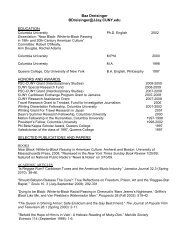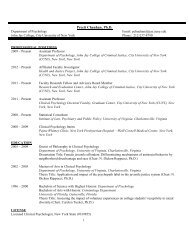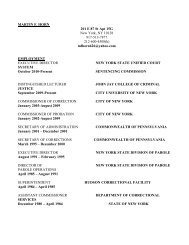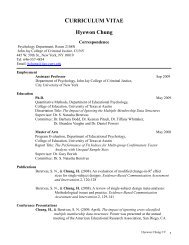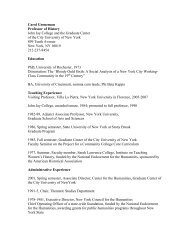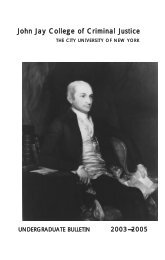Bulletin - John Jay College Of Criminal Justice - CUNY
Bulletin - John Jay College Of Criminal Justice - CUNY
Bulletin - John Jay College Of Criminal Justice - CUNY
Create successful ePaper yourself
Turn your PDF publications into a flip-book with our unique Google optimized e-Paper software.
Courses <strong>Of</strong>fered<br />
include the nature of genetic variation, genetic disorders, genomics,<br />
recombinant DNA and genetic engineering techniques. Emphasis is<br />
placed on quantitative analysis and problem solving.<br />
Prerequisites: ENG 102 or ENG 201, BIO 103-104 or BIO 101-102<br />
and BIO 104, and MAT 301.<br />
BIO 412 Molecular Biology I<br />
9 hours: 3 hours lecture, 6 hours laboratory; 4 credits<br />
Molecular Biology I provides an overview of the current concepts<br />
and techniques in molecular biology. Lecture topics include the<br />
molecular structure of cells, basic genetic mechanisms, control of<br />
gene expression in prokaryotes and eukaryotes, DNA replication,<br />
repair and recombination, and protein structure and function. The<br />
laboratory experiments introduce basic experimental techniques and<br />
research methodology including cell culture, recombinant DNA<br />
techniques, transformation, DNA extraction, electrophoresis,<br />
Southern and Western blotting, and DNA sequencing and analysis.<br />
Prerequisites: ENG 102 or ENG 201, BIO 315, and CHE 315<br />
BIO 413 Molecular Biology II<br />
9 hours: 3 hours lecture, 6 hours laboratory; 4 credits<br />
BIO 413 consists of lectures and laboratory experiments in molecular<br />
biology with special emphasis placed on forensic DNA analysis.<br />
Lecture topics include an overview of forensic biology, statistics and<br />
population genetics including: sample collection; bioethics; DNA<br />
extraction, quantitation, and typing; databases; lab validation<br />
including quality assurance and quality control, and emerging<br />
technologies. Laboratory experiments introduce advanced<br />
experimental techniques such as autosomal STR and “linkage<br />
markers” (Y-STR and mtDNA) analysis, DNA quantitation, and<br />
PCR-STR analysis of simulated “crime scene samples.”<br />
Prerequisites: ENG 102 or ENG 201, and BIO 412<br />
CHEMISTRY (Department of Sciences)<br />
CHE 100 Preparation for General Chemistry<br />
3 hours, 1 credit<br />
A course in chemistry to prepare students for the level of work<br />
covered in CHE 103-104. Instruction will be given in the<br />
fundamental concepts of chemistry. The course provides the<br />
requisite skills needed to solve problems. Open to students who have<br />
not had high school chemistry or students recommended by the<br />
department.<br />
Prerequisite: MAT 103 or the equivalent<br />
CHE 101 General Chemistry I-A<br />
4 hours; 3 hours lecture, 1 hour recitation; 2 credits<br />
This course is primarily intended for students who have not taken<br />
high school chemistry or who have received a grade of less than 80%<br />
on the New York State Chemistry Regents Examination but are<br />
interested in being a Forensic Science or Fire Science major, or are<br />
interested in developing a strong knowledge base of general<br />
chemistry principles. The course provides students with a better<br />
understanding of the chemical world around us and is a prerequisite<br />
for more advanced chemistry courses. CHE 101 is the first semester<br />
of the two-semester CHE 101-102 sequence, which is equivalent in<br />
content to CHE 103 but done at a slower pace with emphasis on<br />
developing needed skills. Topics include: a review of basic<br />
mathematical tools used in chemistry, the structure of the atom,<br />
stoichiometric calculations, aqueous solutions, gases, and an<br />
introduction to the periodic table of elements. Open to students who<br />
have not had high school chemistry, or who received a grade of C or<br />
lower in high school chemistry, or who received a grade of less than<br />
80% on the Chemistry Regents. The entire 101-102 series must be<br />
completed in order to receive credit as a general education science<br />
equivalent.<br />
Prerequisites: Open to students who have not had high school<br />
chemistry, or who received a grade of C or lower in high school<br />
61



